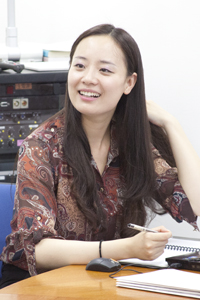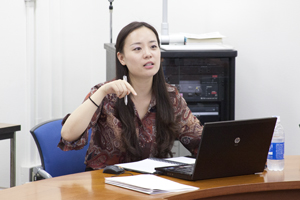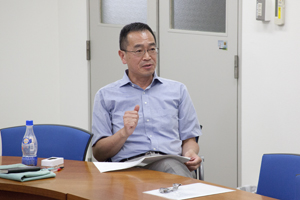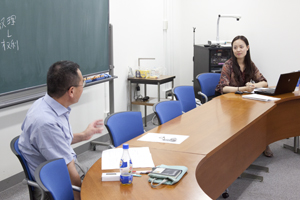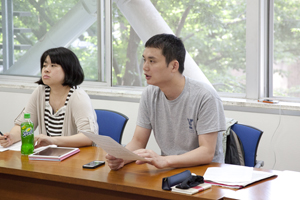News
東文研セミナー「「二元制衡」ー唐・宋交代の際における田土立法方式」が開催されました
題目:「「二元制衡」ー唐・宋交代の際における田土立法方式
講演者:韓 嘨
(中国政法大学・法学院・博士課程、東京大学・東洋文化研究所・訪問研究員)
日時:2014年6月16日(月)午後3時から5時
場所:東京大学・東洋文化研究所・3階・第二会議室
要旨:
唐と宋の「田土立法」は基本的には同様であり、継承の痕跡が明らかである。「二元制衡」の立法方式に始終している。財政の面では、税収を確保し、租庸調制においては土地管理の法令を整え、両税制においては財産所有権を保障することで農業生産及び取引の安全を重んじている。人民の生活の保障の面においては、土地に対して権利を賦与し、土地利益を保護している。このような理想的な二元制衡は、「予取平衡」を図る中国の伝統的哲学の現れである。「二元失衡」の局面では、税収確保を優先する価値観となる。唐宋交代の際において社会経済システムが大きく変化したにも関わらず。田土立法は、「二元制衡」という点においては、不変の立法方式を見ることができる。
研究会報告:
要旨のような内容において報告が行われた後に、討論が行われた。討論においては、以下の点についての質問・意見が出された。
| 1, | <税収の確保と課税対象たる人民の生活の保障とのバランスがはかられ、両者の良好なバランスをとることができない場合には税収確保に傾いたという点から言えば、唐・宋の田土立法は共通性があるというのが報告者の主張である。しかし、この点は人類史における税制及び財産制度全体の共通点といってもいいのであって、とくに唐宋の特徴ということはできない。中国史において、及び、他の地域との比較において、この点での唐宋期の特徴は何か。 |
| 2, | 人民の間の土地取引は、唐代においては、例外的な承認または黙認であったのが、唐末以降宋代においては、正面から認められていたことを指摘しつつも、これは変革というほどのことはない、とするが、ヨーロッパ史との比較ではやはり大きな変化であると言える。また、報告者は唐宋変革論の「変革」を比較的短期間に起こる革命的事象としてとらえた上で、そのような「変革」はなかったとするが、唐宋変革論にいうところの変革とは唐末宋初にわたる長期の過渡的変化を指すのであって、「変革」の意義を狭くとらえているのではないか。 |
| 3, | 均田制において土地を与えられた人民にとっての土地を「権利」の語で表現することは、いかなる意味において可能か。均田制は北朝から唐代前半に行われた壮大な実験であって実際にあったのは人民による土地の保有と取引だったのか。 |
以上の点は、中国法制史の根本に関わる問題であり、報告者のさらなる研究が期待される。
なお、参加者は報告者のほかに6名であった。
主催:東京大学・東洋文化研究所・班研究「中国法研究における固有法史研究、近代法史研究及び現代法研究の総合の試み」(主任 高見澤磨・東京大学・文化研究所・教授)
Title: Research on Counterbalance of Two Elements: Legislation Model of Land Law in Variation Period of Tang and Song Dynasty
Lecturer: HAN, Xiao, China University of Political Scince and Law, Research Fellow of Institute for Adbanced Studies on Asia
Date: 16/June/2014
Time and Place: 3pm-5pm at the Meeting Room 2, 3rd floor of the Institute for Advanced Studies on Asia, the University of Tokyo
Language: Chinese( without interpretation)
Abstract:
There is obvious inheritance between tang and song dynasties on legislation model of land law. Counterbalance of two elements, which is called legislation model, had always been carried out by tang and song’s land legislation. One element was that land legislation safeguards the government tax on land soil. For instance, under the ‘Zu-Yong-Tiao’ system, it made the effort to perfect the field management ,while under the ‘Two taxes’ system, it turned to protect property rights, agricultural production and trade security. The other element was that land legislation also guaranteed people’s life, provided them land rights, and protected interest of their land. Under ideal condition, counterbalance of two elements reflected Chinese traditional philosophy of the balance between “given” and “returned”. The tax would have been the primary value with unbalance of the two elements. The land legislation had run through the great changes of the society, and the form of the legislation had kept the same strain, even though great changes had taken place from Tang to Song.
The continuity was greater than transformation obviously with the development of land legislation from Tang to Song.
Report:
After the presentation, the participants discussed on three questions.
| 1, | The lecturer said Song Dynasty inherited Tang Dynasty's land system as the counterbalance system of two elements, to secure tax income and to secure the survival of people. However, this balancing should be common for the history of the human race. What was/were the notable features of the two dynasties? |
| 2, | The lecturer pointed out that there had been a social and legal change from tacit approval of land trade in the first half of Tang dynasty to formal approval of land trade in second half of Tang ,the five Dynasties and Song Dynasty, and that it had been a natural change for long term, not revolutionary change, so it can be called inheritance. If the lecturer would like to call it inheritance, it is necessary to define the word of "inheritance". |
| 3, | People were given land by the dynasty, at least in the first half of Tang .Can we say people had the property "rights"? |
They are the basic and interesting questions on Chinese legal history. We expect more studies on these questions by the lecturer for her Doctoral thesis.
Hosted by Regular Researc Project of An Attempt at the Integration of Studies in the Traditional, Modern and Contemporary Chinese Legal System (Prof. TAKAMIZAWA,Institute for Advanced Studies on Asia, the University of Tokyo)
当日の様子
担当:高見澤
登録種別:研究活動記録
登録日時:TueJun2413:52:522014
登録者 :高見澤・野久保(撮影)・藤岡
掲載期間:20140616 - 20140916
当日期間:20140616 - 20140616

